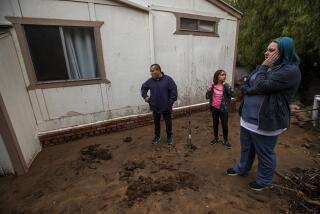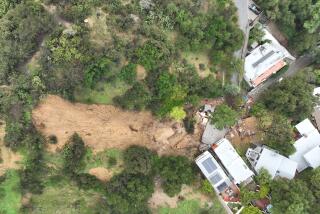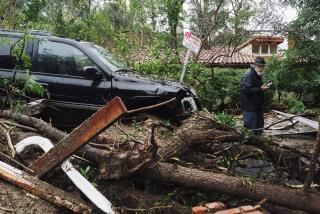Mudslides batter Southern California residents who suffered through fires
Fire, rain, then mudslides. It’s a formula for disaster.
Dozens of Southern California residents in burn areas in Camarillo Springs, Glendora and Azusa saw that treacherous scenario play out Friday as communities previously scorched by wildfire were hammered by a powerful storm.
The storm, the largest to hit the Southland in several years, once again brought devastation to areas charred by wildfire. With every significant rain, residents in these communities face the threat of rocks and debris flooding their homes.
“The mud hit my front door and blew out the front window,” said Camarillo Springs resident Bill Golubics early Friday morning. He was taken by emergency crews to a Red Cross shelter.
In 2013, the Springs fire consumed 24,000 acres in Camarillo Springs. On Friday, eight homes suffered significant damage from mud, rocks and debris as a hill behind them came down.
John Calka and wife Connie were awakened about 2 a.m. in their house in the community by authorities when the rocks started rolling down their street.
He said the slide occurred in the same place it happened on Halloween.
“This is a great place to live. What caused all this is the fire,” he said.
Fire has also left residents in Glendora and Azusa at the mercy of Mother Nature.
Those communities were affected by the 2,000-acre Colby fire on Jan. 16, which destroyed six homes and damaged eight others.
On Friday morning, Edward Heinlein, 66, pointed to a mass of mud that overtook the upper part of his backyard in Azusa.
His property sits at the foot of a mountain burned by the Colby fire that he says has almost a “straight down” incline.
“We were hoping to get through Christmas,” Heinlein said. “But we might have to move out.”
Officials declared mandatory evacuations for parts of the Silverado Canyon area in Orange County, fearing that hills that had been raked by wildfire in September could slide down into homes.
But Keith Buller and his wife, Rhonda, both 52, said they were more worried about a small creek behind their home.
“When it rains hard, it roars,” Buller said of the usually modest creek.
Though their home was under the evacuation order, the couple decided to stay, keeping an eye on a creek that had been cleaned up after the fire to keep it from becoming engorged by rain.
“I don’t expect it to get out of control,” Buller said. “We’d have to get a super cell to come and stop right over us, I think.”
More to Read
Start your day right
Sign up for Essential California for news, features and recommendations from the L.A. Times and beyond in your inbox six days a week.
You may occasionally receive promotional content from the Los Angeles Times.







